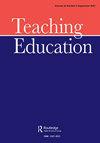Conceptualising Bedouin teachers’ social-emotional learning in the context of teaching children with neurodevelopmental disorders
IF 1.1
Q2 EDUCATION & EDUCATIONAL RESEARCH
引用次数: 1
Abstract
ABSTRACTSocial-emotional learning (SEL) has received growing attention in recent decades. Although much is known about the benefits of integrating SEL in educational settings, knowledge about teachers’ SEL learning is limited, particularly among special-education teachers from diverse backgrounds. The study’s goals were: (1) to conceptualise the SEL learning of 30 in-service and preservice special-education teachers from the Bedouin community, where emotional restraint is the social norm; (2) to compare the learning patterns of teachers in different career stages. An exploratory case study was employed in a special-education school. Data collected from 20 interviews, 147 reflections and two focus groups were analysed using mixed methods (content analysis, exploratory analysis, and quantitative analysis). The findings revealed a three-phase model denoting teachers’ SEL learning – intrapersonal, interpersonal, and professional. Career stage-based differences were found. The study enhances our theoretical understanding of teachers’ SEL learning, which ultimately may promote best SEL practice in special education.KEYWORDS: Social-emotional learningneurodevelopmental disordersspecial-educationmulticulturismexploratory case studyprofessional learning Disclosure statementNo potential conflict of interest was reported by the authors.Notes1 All names are pseudonyms to maintain participant confidentiality.贝都因教师的社会情绪学习在神经发育障碍儿童教学中的概念化
摘要近几十年来,社会情绪学习受到越来越多的关注。虽然人们对将SEL融入教育环境的好处了解很多,但对教师SEL学习的了解有限,尤其是来自不同背景的特殊教育教师。本研究的目的是:(1)对30名贝都因社区在职和职前特殊教育教师的SEL学习进行概念化,贝都因社区以情绪约束为社会规范;(2)比较不同职业阶段教师的学习模式。在一所特殊教育学校进行了探索性案例研究。从20个访谈、147个反思和两个焦点小组收集的数据采用混合方法(内容分析、探索性分析和定量分析)进行分析。研究结果揭示了教师SEL学习的三个阶段模型——内部性、人际性和专业性。发现了基于职业阶段的差异。本研究增强了我们对教师SEL学习的理论认识,最终促进特殊教育中SEL的最佳实践。关键词:社会情绪学习;神经发育障碍;特殊教育;多元文化;注1为了保证参与者的机密性,所有的名字都是假名。
本文章由计算机程序翻译,如有差异,请以英文原文为准。
求助全文
约1分钟内获得全文
求助全文
来源期刊

Teaching Education
EDUCATION & EDUCATIONAL RESEARCH-
CiteScore
3.80
自引率
6.20%
发文量
15
期刊介绍:
Teaching Education is an interdisciplinary forum for innovative practices and research in teacher education. Submission of manuscripts from educational researchers, teacher educators and practicing teachers is encouraged. Contributions are invited which address social and cultural, practical and theoretical aspects of teacher education in university-, college-, and school-based contexts. The journal’s focus is on the challenges and possibilities of rapid social and cultural change for teacher education and, more broadly, for the transformation of education. These challenges include: the impact of new cultures and globalisation on curriculum and pedagogy; new collaborations and partnerships between universities, schools and other social service agencies; the consequences of new community and family configurations for teachers’ work; generational and cultural change in schools and teacher education institutions; new technologies and education; and the impact of higher education policy and funding on teacher education. Manuscripts addressing critical and theory-based research or scholarly reflections and debate on contemporary issues related to teacher education, will be considered. Papers should attempt to present research, innovative theoretical and/or practical insights in relevant current literature and debate.
 求助内容:
求助内容: 应助结果提醒方式:
应助结果提醒方式:


